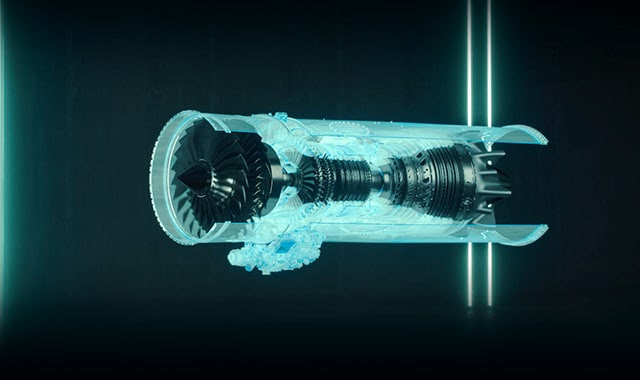Differentiation through scaling
UK, December 7.
With an ever-growing interest in strengthening defence capabilities by relying on uncrewed weapon systems, Head of Defence for Future Programmes in Germany René Bernstein talks about the need for Germany to consider adopting Rolls-Royce Deutschland’s approach of utilising proven civilian technology for military programmes.

“With over 1,000 engineers on-site in Dahlewitz, Rolls-Royce Deutschland is showcasing innovation and cutting-edge technology in a highly demanding market segment to generate confidence in national capabilities.
“One way this is being achieved is through ongoing investment into the new Advance2 core. Made in Germany, the Advance2 core is the most powerful and efficient core engine technology in its class and is a state-of-the-art solution for heavy remote carriers known as Wingman.
“The Pearl engine family – which features this core – has already been selected to power five aircraft types from various manufacturers for several reasons.
“Setting new standards in business aviation in terms of thrust and fuel consumption, the Advance2 core engine can be viewed as the backbone of future advanced propulsion systems of future larger-class uncrewed weapon systems. With an output of between 15,000 and 20,000 pounds of thrust (67 – 89 kN), the engine can be scaled in line with the customer’s requests without having to invest again in time-consuming and costly basic technological research first. Even with its higher performance, the engine emits significantly less CO2 and NOx than its predecessors and is up to 7% more fuel efficient as well as quieter.
“The approach of using modern and market-available civilian technologies with a stable value chain reduces overall risk and makes it possible to control the cost of such an investment. In turn, this strengthens the international competitiveness of such a weapon system in the long-term and increases the odds of achieving widespread acceptance in the market.
“This isn’t the first time Rolls-Royce has transferred proven civilian technologies to military programmes; the AE 3007 engines were used to power the Global Hawk reconnaissance drones and the F130 was used to modernise the American B-52 fleet, which is a derivative of the civilian BR725 engine from Dahlewitz.
“In a political environment such as Germany’s, which has been dominated in the past few decades by cutting back on investments in military technology development, the use of civil technology within the Next Generation Weapon System is a logical conclusion.
“Going beyond this, the export market should not be neglected if Germany’s investments are to pay off. A framework that enables the industry to export weapon systems beyond Europe needs to be created if Germany is to have a part in the international market, in turn strengthening our political influence.
“German Foreign Trade Law not only makes it difficult to export existing weapon systems; it also diminishes the appeal of Germany as a location for the industrial sector, especially in terms of international collaboration programmes, and such an issue reduces the country’s competitiveness in an international context.
“If Germany and its defence industry are to play a leading role in future programmes, the country needs to take targeted strategic investments in the national industry and create positive framework conditions including new regulations on the export of military goods.
“Only then, when the legal framework is correct, will Germany’s national defence industry be able to retain a broader position and attract the necessary attention that will enable the country – in addition with its reputation as a manufacturing powerhouse – to take on a leading role in technological innovation for military aviation in the long-term.”





